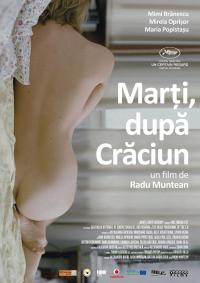
MARTI DUPA CRACIUN (TUESDAY AFTER CHRISTMAS)
Romania, 2010, 99 minutes, Colour.
Mimi Branescu, Mirela Oprisor, Maria Popistasu.
Directed by Rado Muntean.
Yes, another film about an affair and a marriage breaking up. But, no, it is not your usual drama on this theme.
Because the director has chosen a different style of film-making from the hurried plot snippets of so many contemporary dramas, with their TV-like action and reaction quick edits, the film is more real, more natural and more insightful. The film consists of a series of long takes for each sequence, often several minutes long. This means that the performances are extended, played out in a manner that is both akin to theatre as well as being as mundane as real life. It means that the screenplay has had to have much more care in the writing of dialogue that illustrates the experiences of the characters at some length as well as being more ‘naturalistic’, the way that people speak in life rather than in contrived dramatic form.
As expected, the plot is nothing not seen before: the banker who has fallen in love with a younger woman (actually, his young daughter’s dentist). He has been married for years to a competent woman who has become ‘at home’ in her role as wife and mother. Other characters include the husband’s friend and his parents. But, by and large, the action is confined to the central adult characters and the daughter, opening rather daringly with a post-lovemaking, naked sequence introducing the characters from the affair point of view, their jokes, playfulness, intimacy and carefree attitude towards any hurt they may be inflicting. The next sequence is a shopping sequence where we are introduced to the wife.
Particularly impressive is the single take where he reveals the truth to his wife and she moves from stunned, to hurt, to angry, to calculating. It is a fine addition to the number of substantial films coming from Romania in recent years.
Marriage counsellors might well welcome this film for clients to compare their own behaviour and its consequences.
1. A period of excellence for Romanian films? This film in this group?
2. The realistic situations and characters? Insight and response?
3. The setting of the dialogues in interiors, the rooms, home, restaurants, shops? The scenes on the road? Musical score?
4. The cinematic style, the long takes, up to three minutes, performance as theatre, strong and long dialogue? No reaction shots? The audience observing, liking and disliking?
5. The introduction to Paul and Raluca, the sexual encounter, talk, intimacy, naked, the light touch, jokes, cigarettes, Christmas, Santa, playful?
6. The introduction to Adriana, the shopping, Paul as normal, the gifts, trying on the clothes, decisions?
7. The introduction to Mara, her age, the gifts, Santa, her delight, her parents and relationships?
8. Kristy and his girlfriend, Adriana and Paul and the discussions, memories, age, chat?
9. Paul and his infidelity, lies, the trip, the phone calls?
10. Mara and her teeth, the braces issue, the visit, the kind doctor, Raluca and the serious discussions, Adriana thinking about this discussion in retrospect and her dismay?
11. Paul’s father, shopping for the Christmas tree? The scenes with his parents, at their home, the gifts?
12. Mara and her piano lessons?
13. Paul going to Constanta, his meeting Raluca’s mother, her disapproval, Raluca and her reaction, put out, the gift of the watch, relenting, her gift for Mara? No guilt feelings?
14. Paul, his coming home, Cosmina, the discussion of gifts and the telescope?
15. His telling Adriana, the long take, the drama, her silence, Paul and justifying himself, not wanting to hurt others, his being the victim? Adriana and her anger, weeping, the issue about telling Mara, his responsibility? Her discovering that the woman was Raluca?
16. Christmas at his parents’, Mara and her gifts, Adriana and the details for court, divorce, written permissions?
17. The sudden ending, the audience left with the problems and the dilemmas?
18. The picture of an affair, the marriage break-up – as real?